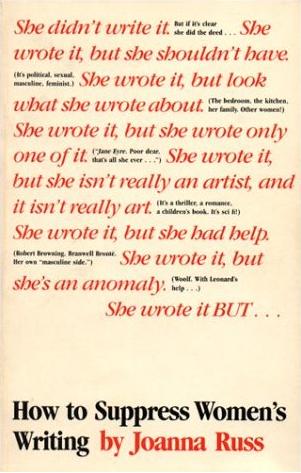
“She didn’t write it. But if it’s clear she did the deed… She wrote it, bit she shouldn’t have. (It’s political, sexual, masculine, feminist.) She wrote it, but look what she wrote about. (The bedroom, the kitchen, her family. Other women!) She wrote it, but she wrote only one of it. (“Jane Eyre. Poor dear. That’s all she ever…”) She wrote it, but she isn’t really an artist, and it isn’t really art. (It’s a thriller, a romance, a children’s book. It’s sci fi!) She wrote it, but she had help. (Robert Browning. Branwell Brontë. Her own “masculine side”.) Sje wrote it, but she’s an anomaly. (Woolf. With Leonard’s help…) She wrote it BUT…”
That’s the cover of How to Suppress Women’s Writing, Joanna Russ’ classic examination of all the ways women’s writing has been written out of literary history. The cover sort of gives the game away in how that was and is done. It’s so easy to outright deny or minimise female contributions to literature, consciously or unconsciously because despite a century of feminism, we’re still living in a male orientated world. Whether we like it or not, people like me — white, western, male, straight — are the default and if we don’t watch ourselves we find it easy to ignore all those not like us, while immediately finding it strange if we’re not present in our fictions, either as author or character.
In science fiction, despite its self asserted reputation of openmindedness, things are no better. If have been following this blog for a while, you know this, as we hashed this all out last year as well. That’s why I started a project to read at least one science fiction or fantasy book written by a woman per month, just to counter my own subconscious tendency to stick to male authors. The personal is the political after all and if I don’t take the trouble to look after my own reading, I can’t really fault others for ignoring female writers. It may seem odd to police your pleasure reading that way, but I’ve found that if I don’t, I get stuck in the same rut with the same male authors over and over again. I don’t just do it because it’s good for science fiction if more people pay as much attention to female as to male writers, but because it’s good for me.
Just because a few of us felt this way last year, doesn’t mean the war is being won of course. At the moment science fiction has gotten a bit more media attention again, if only through the by all accounts brilliant exhibition at the British Library, but sadly it has revealed that it’s still the male writers who get most of the attention. As Nicola Griffith found out, when The Guardian asked its readers to name its favourite sf books/writers, only 18 out of 500 writers were female. It reminded her of what Joanna Russ had analysed so well thirty years ago and it inspired her to a call for action:
Clearly, women’s sf is being suppressed in the UK. Oh, not intentionally. But that’s how bias works: it’s unconscious. And of course sometimes it’s beyond a reader’s power to change: you can’t buy a book that’s not on the shelf. You can’t shelve something the publisher hasn’t printed. You can’t publish something an agent doesn’t send you. You can’t represent something a writer doesn’t submit. Etc.
But, whether this bias is active or passive, it’s time to attack it on several fronts:
-
reexamine and rewrite Best Of lists to take into account women who have been relegated to also-rans (this will involve public discussion and reevaluation)
-
rexamine and republish Classics to include those women who, through the process Russ delineates, have slipped down the rankings (ditto)
-
revive the old-style Women’s Press list of sf, historic and contemporary, by women writers
-
acknowledge, in media pieces, likely inherent bias
-
writers, stop self-censoring
-
agents, stop narrowing the funnel
-
editors, consider balancing your list
-
booksellers, pay attention to your readers and categories
-
readers, give books and writers a chance
-
etc.
And always, always name the behaviour around you: we can’t change behaviour until it’s named.
From there on, Nicola called for The Russ pledge:
The single most important thing we (readers, writers, journalists, critics, publishers, editors, etc.) can do is talk about women writers whenever we talk about men. And if we honestly can’t think of women ‘good enough’ to match those men, then we should wonder aloud (or in print) why that is so. If it’s appropriate (it might not be, always) we should point to the historical bias that consistently reduces the stature of women’s literature; we should point to Joanna Russ’s How to Suppress Women’s Writing, which is still the best book I’ve ever read on the subject. We should take the pledge to make a considerable and consistent effort to mention women’s work which, consciously or unconsciously, has been suppressed. Call it the Russ Pledge. I like to think she would have approved.
This in turn inspired Ian Sales, who had been part of the debate last year as well, to start the SF Mistress Works blog, dedicated fto establishing a line of potential “Mistress Works”, classical sf novels written by women, ala the actually existing Gollancz SF Masteworks line. He’s calling for reviews of those works he has already put up as potential Mistress Works, either existing or new ones; I might just take him up on that.
As long as it’s not as natural or easy to think of female sf writers as it is to think of male ones, the Russ Pledge and initiatives like Ian Sales’ are necessary. As Maura McHugh says in in the title of her excellent summing up of the current “controversy”, be part of the solution. Take the Russ Pledge today!
